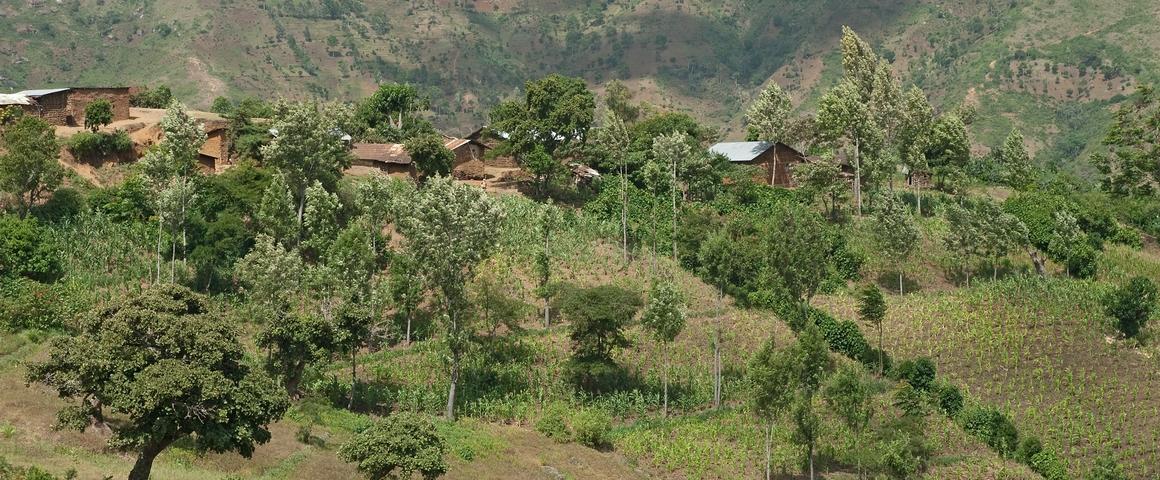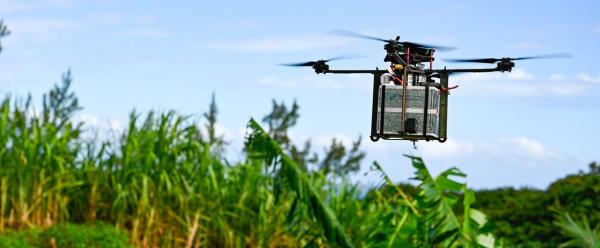Results & impact 10 October 2025
- Home
- Press area
- Press releases
- Nitrogen fertilizers for crops in East Africa
Mineral fertilizer use can improve food security in East Africa

Farms in the Usambara Mountains, Tanzania © Rik Schuiling, TropCrop-TCS
More than a third of households in sub-Saharan Africa are food-insecure. "Yields for maize, the main food crop in the East African regions studied, are just 1700 kg/hectare on average", says CIRAD agronomist Gatien Falconnier, lead author of a new study published in Agricultural Systems. "However, the climate and soil physical properties should enable yields of around 8000 kg/hectare in many of the continent's regions." One major reason for this production shortfall is the limited supply of soil mineral nutrients required for plant growth. "This low fertility is due to the alteration of minerals in these very ancient soils, a lack of organic resources (manure, compost, plant waste returned to the soil, etc), and very low mineral fertilizer use." The study showed that appropriate mineral fertilizer use could significantly reduce food insecurity among farming households, with potential advantages on a national level in two East African countries, if fertilizers were more readily available.
Benefits for food security on small- and large-scale family farms
The team worked on a large set of field observations in two countries: Uganda and Tanzania. In Tanzania, switching from 9 kg of nitrogen input/hectare from fertilizers to 82 kg/hectare would reduce the percentage of food-insecure farming households, which are mostly small farms, from 28% to 13%. In Uganda, there would be less impact and the optimum nitrogen input was estimated at 24 kg per hectare. Shamie Zingore, co-author of the study and researcher at the African Plant Nutrition Institute, explains: "The economic viability of investing in fertilizers depends not only on crop yields and on the price of mineral fertilizers – which is higher in Uganda than in Tanzania, for example – and that paid to farmers for maize, but also on farmers' capacity to fund fertilizer purchases".
However, increasing fertilizer use would still be worthwhile in Uganda: the researchers consider that applying fertilizer on larger family farms (20 to 30 % of producers) could contribute to food security on a regional level. Models suggest that these farms could produce more than they need and thus help to satisfy regional requirements, with a predicted 60% increase in maize supplies in Tanzania and Uganda.
Targeting priority zones and making fertilizers more accessible to farmers
This work could serve to target priority zones for improving farmers' access to fertilizers and providing technical support to ensure appropriate use. "The regions with potential to improve national output are not necessarily those where it is possible to improve food security among the poorest households in the immediate future. Any operations to make fertilizers more accessible and support their use should therefore target these different zones", Gatien Falconnier points out. Shamie Zingore adds: "Short-term government policies should focus on fertilizer accessibility in areas where prices are favourable, while also investing in long-term market development to boost accessibility in less favourable zones".
Other types of operations could be envisaged for farmers in the most isolated zones who would not immediately benefit from access to fertilizers, for instance providing appropriate financial support in the form of direct payments.
In addition to the positive short-term impact on crop yields of applying fertilizers, agroecology researchers are working to change cropping systems to optimize ecological processes and reduce fertilizer requirements as much as possible. Recent work on the benefits of green fertilizers for rice yields is looking promising.
The studies conducted will fuel a new report on the topic due to be presented at the African Union Fertilizer and Soil Health Summit in June 2023, organized by IFDC.
”The efficacy of mineral fertilizer applications in terms of boosting cereal yields is well known across Africa", says Gatien Falconnier. "However, few studies have gone as far as modelling the effects on food security." The modelling operations conducted during the study were based on 16 000 observations of maize response to fertilizers. They provided an estimate of optimum profit-maximizing fertilizer rates for a representative sample of 4188 farming households. ”The study included broad datasets representative of East Africa, and other studies should allow us to fine-tune the results for other countries in sub-Saharan Africa”.
Reference
Gatien N. Falconnier, Louise Leroux, Damien Beillouin, Marc Corbeels, Robert J. Hijmans, Camila Bonilla-Cedrez, Mark van Wijk, Katrien Descheemaeker, Shamie Zingore, François Affholder, Santiago Lopez-Ridaura, Eric Malézieux, David Makowski, Jairos Rurinda, Martin K. van Ittersum, Bernard Vanlauwe, Ken E. Giller, Sabine-Karen Lammoglia, Katharina Waha (2023), Increased mineral fertilizer use on maize can improve both household food security and regional food production in East Africa, Agricultural Systems, Volume 205, 103588, ISSN 0308-521X.



























